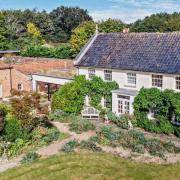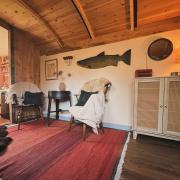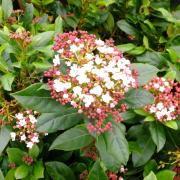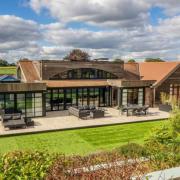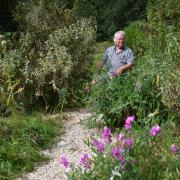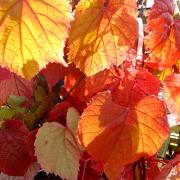By Sarah Harris Connecting participants with the outdoors while improving wellbeing is the concept behind Soil to Soul, a series of free outdoor events at Marlpit Community Garden in Norwich run by Amy Woods and Shona Sundhari.
It is often said that nature feeds the soul, and there is an endless amount of evidence to prove that spending time outdoors greatly improves wellbeing. Mental health charity Mind has found that one in four people will experience a mental health problem of some kind in their lifetime, and getting outside is advised as an effective way to feel more positive, peaceful and energised.

Amy Woods and Shona Sundhari have joined forces to deliver sessions that serve this purpose. Soil to Soul is a community project, backed by the National Lottery Community Fund, which is run for free on a monthly basis at Marlpit Community Garden in Norwich. The first event was held in April and the project will run until February 2024, when it will be reviewed and potentially continue or evolve.
Amy says: “We wanted to specifically create something about growing food, our relationship to the land and the process of being in touch with the soil. The classes, which run from 10.30am to 2.30pm, also enhance confidence and promote wellbeing, while creating a sense of community through learning and eating lovely fresh food together.”
The sessions are the perfect fusion of Amy and Shona’s respective disciplines. Amy is a certified eating psychology coach and the founder of SoulShine – a social enterprise which connects and inspires people while challenging social norms surrounding body image, holistic health and wellbeing. Shona is a former special educational needs teacher and now a forestry school leader, who loves being outdoors and sowing, growing and harvesting.

Shona adds: “Both of our passions are bringing people together while connecting with nature and learning from each other. The classes are a way of demonstrating that we are not solo individuals walking this earth on our own; we are better together when we hear each other and connect with the land.”
As well as learning about nature by identifying and foraging plants and herbs, each class includes opportunities to practise land-based skills, create crafts with natural materials and engage in embodied movement or dance. There is the chance to reflect, with a focus on breathing and stillness, and to speak from the heart in a community sharing circle.
Commenting on the importance of speaking in a shared environment that is open, receptive and calm, Amy says: “In the sharing circle, we have a talking piece and pass it around. It’s not a conversation, but a chance for people to take the time to listen to the speaker. It encourages the speaker to share more freely and honestly without being interrupted. It is a special way of communicating and sharing exactly what's in your heart.”

Indeed, there is a symbiotic relationship between feeling mentally and physically free, highlighting the importance of the garden setting. Here, Shona and other community growing project volunteers will teach various skills and techniques, from simple methods such as planting a potato, to mastering the art of managing a fruit cage or grafting apple trees. The emphasis is that you don’t have to be a master gardener or herb expert to enjoy the classes, and all abilities are welcome.
The group has already made a hawthorn tincture and Shona has other ideas up her sleeve with which to invite further appreciation for the world around us: “I want to use plants to create a hapa zome (a Japanese art form which uses a mallet to create a leaf or petal prints). It's beautiful and you can really get up close and see the lines, which are not dissimilar to the veins in our hands.”

Each class also has an underlying theme of sustainability, as Shona explains: “Our climate is undergoing a massive change. People will need to know about nature, growing food and looking after the land, so we want to create a long-term impact. By coming here, participants will be playing a part, and they can share their knowledge with their family, friends and neighbours. The idea is to come, learn and explore, then we will see a ripple effect outward.”
Participants don’t have to commit to all the scheduled dates and can attend whenever they wish. There is also an invitation to join a monthly online Zoom call, and an optional Facebook group and Whatsapp group to stay connected.

With dates set for the autumn and winter, each group will have the chance to see and experience the change of seasons. This time of the year can cause Seasonal Affective Disorder, otherwise known as SAD, posing the perfect opportunity to get outdoors in the natural light.
“There is shelter here, so if the weather changes, we can adapt. It’s all about resilience, perseverance and connecting with the elements. We can teach skills with tarpaulin in how to create a shelter and the best clothes to wear to keep you warm and dry. There’s a saying that there’s no such thing as bad weather, just bad clothes.”

Already, the hosts have noticed a difference among their participants from the beginning of each session to the end, when they arrive perhaps feeling tired or anxious and leave feeling free and revitalised. One participant even referred to the classes as ‘a sanctuary’, offering a refuge with which to escape the humdrum of daily life.
Shona concludes: “We need space. Our lives are very full, pressured, structured and routine-led, but just by being outside with our hands on the earth, looking at trees and hearing bird song, we feel good, and we are connected.”
To find out more about Soil to Soul or if you’re part of a community growing project who would like to get involved, visit soulshinenorfolk.org.uk/soil-to-soul-2/








